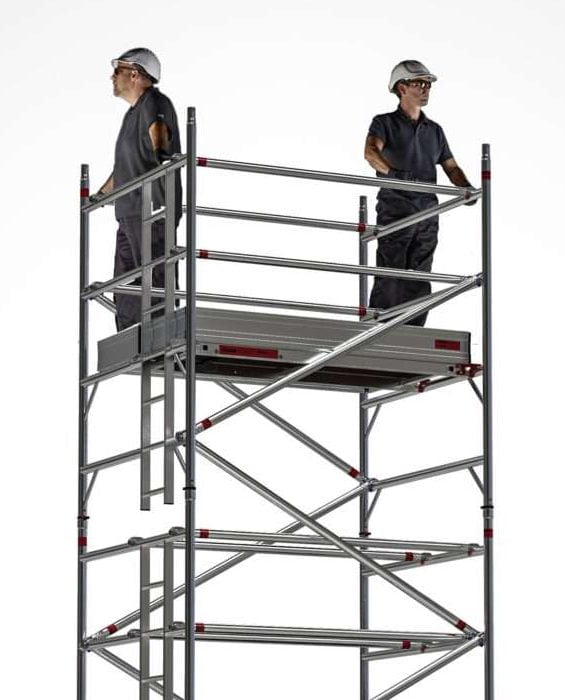Discovering the Numerous Kinds of Scaffolding Utilized in Construction Projects
The construction sector depends heavily on numerous kinds of scaffolding to satisfy details project demands, each offering distinctive benefits and applications. Traditional framework scaffolding supplies a durable structure for basic jobs, while suspended scaffolding is vital for deal with skyscraper structures. Various other choices, such as system and rolling scaffolding, provide to effectiveness and mobility, specifically. The cantilever variant verifies invaluable in metropolitan settings where space is constricted. Understanding the subtleties of these scaffolding types is important for maximizing safety and security and performance on building and construction sites, triggering a more detailed examination of their special features and applications.

Conventional Framework Scaffolding
Conventional frame scaffolding is just one of one of the most commonly utilized approaches in the building industry as a result of its toughness and flexibility. This system contains upright and straight frameworks that are put together to develop a steady platform for products and workers. The major parts include vertical articles, horizontal journals, and diagonal dental braces, which together supply a solid framework that can support substantial tons.
Among the crucial benefits of conventional structure scaffolding is its adaptability to different building and construction tasks, ranging from household structures to large commercial structures. The modular layout enables for very easy setting up and disassembly, making it efficient for both lasting and temporary tasks. Additionally, the system can be personalized in elevation and size, fitting different building designs and website problems.
Security is paramount in scaffolding applications, and standard framework systems are furnished with guardrails and toe boards to prevent falls and guarantee worker defense. Routine evaluations and adherence to security guidelines are essential in keeping the honesty of the scaffold (Scaffolding). Overall, typical framework scaffolding stays a basic choice in the construction market, offering a reliable system for labor and improving total job effectiveness

Suspended Scaffolding
Put on hold scaffolding offers a special solution for construction jobs that need accessibility to raised surface areas, specifically in circumstances where typical frame scaffolding might be not practical. This sort of scaffolding is usually put on hold from the roofing system or top levels of a framework, making use of a system of ropes, systems, and sheaves to create a working area that can be readjusted to various heights.
One of the key advantages of put on hold scaffolding is its versatility. It can be easily repositioned or decreased to suit changes in construction needs, making it ideal for tasks such as home window installment, façade job, and maintenance on skyscrapers. Furthermore, the marginal footprint of put on hold scaffolding enables far better use of ground space in metropolitan settings, where space is commonly limited.
Security is a vital factor to consider in the use of suspended scaffolding. In general, suspended scaffolding supplies a reliable and effective option for accessing hard-to-reach areas in numerous building and construction scenarios, improving both performance and safety on website.
System Scaffolding
System scaffolding, typically considered a modern-day solution in the scaffolding market, includes pre-engineered elements that can be promptly constructed and adapted for numerous construction jobs. Scaffolding. This kind of scaffolding is defined by its modular layout, which permits flexibility and efficiency on job websites, fitting structural needs and various elevations
Usually made from high-strength steel or light weight aluminum, system scaffolding provides improved resilience and security. The elements consist of vertical messages, straight journals, and angled dental braces, which interconnect firmly, making certain a durable framework. The design often includes standardized installations, streamlining assembly and disassembly procedures, thereby decreasing labor time and expenses.

Rolling Scaffolding
Rolling scaffolding is a functional choice to typical set scaffolding, made for flexibility and ease of use on construction websites. This type of scaffolding includes a platform sustained by structures with wheels, enabling workers to quickly transfer it as needed. The mobility attribute dramatically boosts efficiency, as it reduces downtime related to disassembling and constructing fixed scaffolding.
Typically built from lightweight products such as light weight aluminum or steel, rolling scaffolding provides a tough yet portable solution for tasks requiring frequent repositioning - Scaffolding. It is particularly useful in tasks such as paint, drywall installation, and electrical work, where access to different heights and areas is required
Safety is vital in rolling scaffolding style, with functions such as locking wheels to prevent unintended movement when in operation, and guardrails to safeguard employees from falls. Additionally, numerous versions are flexible in height, accommodating numerous job needs.
Cantilever Scaffolding

The style of cantilever scaffolding commonly entails making use of arms or braces anchored to a structure or structure, allowing the platform to prolong outward safely. Safety and security is critical; therefore, these scaffolds have to be engineered to hold up against environmental conditions and numerous loads. Regular assessment and upkeep are vital to ensure structural honesty and employee security.
Cantilever scaffolding is favored for its adaptability and reliable usage of space, making it a prominent selection website link in metropolitan atmospheres where area restrictions are usual. In addition, it helps with easier accessibility to high elevations, eventually adding to the total effectiveness of construction jobs. Just like all scaffolding types, correct training and adherence to safety requirements are vital for employees utilizing cantilever scaffolding.
Final Thought
Traditional framework scaffolding gives security, while suspended scaffolding offers adaptability for raised tasks. System scaffolding facilitates quick setting up, and rolling scaffolding improves wheelchair for varying job environments.
Typical structure scaffolding gives a strong structure for basic tasks, while put on hold scaffolding is crucial for job on skyscraper frameworks.Rolling scaffolding is a functional option to typical fixed scaffolding, designed for wheelchair and ease of use on building sites. As with all scaffolding types, proper training and adherence to safety requirements are critical for employees using cantilever scaffolding.
Conventional structure scaffolding provides security, while suspended scaffolder jobs scaffolding uses versatility for elevated jobs. System scaffolding helps with fast assembly, and rolling scaffolding improves movement for varying job environments.